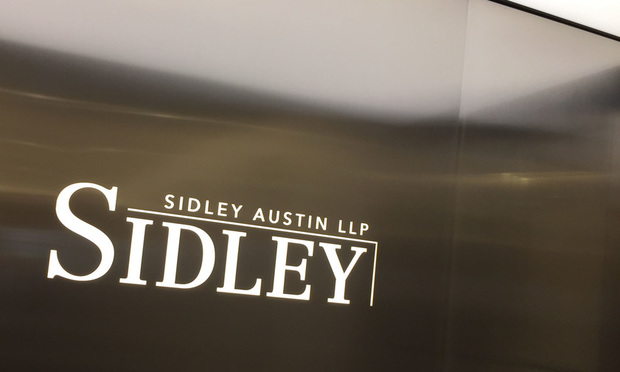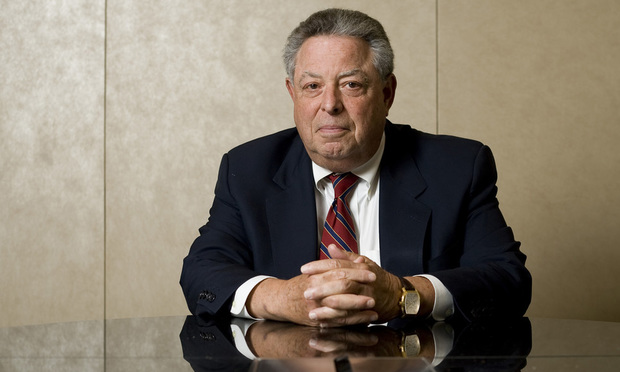Sidley Austin Augments Huawei Work With New US Lobbying Notice
The three-lawyer Sidley Austin lobbying team for Huawei includes veteran white-collar defender Thomas Green, who's on the team advising former Trump campaign aide and Manafort business associate Rick Gates.
August 12, 2019 at 10:13 AM
5 minute read
 Sidley Austin offices in Washington, D.C. (Photo: Diego M. Radzinschi / ALM)
Sidley Austin offices in Washington, D.C. (Photo: Diego M. Radzinschi / ALM)
Updated 1:16 p.m.
Three lawyers from the law firm Sidley Austin LLP with white-collar and export sanctions experience have registered to lobby for the Chinese telecom Huawei Technologies Co. as the company faces federal regulatory and enforcement scrutiny and uncertainty over the scope of future U.S. sales.
Washington-based senior counsels Thomas Green and Robert Torresen will advocate for Huawei with Sidley partner Mark Hopson, a white-collar trial lawyer, according to a new registration. The lobbying registration was the first ever for each of the Sidley Austin lawyers.
Torresen focuses on export control and economic sanctions, and Green, a prominent criminal defender, formerly managed Sidley Austin’s white-collar practice group in Washington. Green is on the defense team for Rick Gates, a former Trump campaign aide and business associate of Paul Manafort’s who pleaded guilty and cooperated in the special counsel’s Russia investigation.
Sidley Austin’s lobbying registration said the firm will advocate on “export controls, trade and economic sanctions, and other national security-related topics.” The effective date of the registration was July 1. The contract broadens the firm’s work for the embattled Huawei, which is suing federal agencies in two cases and more broadly fighting the Trump administration over restrictions on U.S. sales amid escalating trade tension between China and the U.S.
“We are not going to do business with Huawei. And I really made the decision. It’s much simpler not doing any business with Huawei. That doesn’t mean we won’t agree to something if and when we make a trade deal,” President Trump said Friday.
In May, the Commerce Department said Huawei is “is engaged in activities that are contrary to U.S. national security or foreign policy interest.” Reuters reported last week that the U.S. Commerce Department was reviewing whether to grant certain special licenses that would permit some sales to the company.
Green declined to comment Monday about the firm’s lobbying work.
 Thomas Green of Sidley Austin. (Photo: Diego M. Radzinschi/ ALM)
Thomas Green of Sidley Austin. (Photo: Diego M. Radzinschi/ ALM)Sidley Austin lawyers representing Huawei sued the Commerce Department in the U.S. District Court for the District of Columbia in June over the seizure of company equipment that had been en route to China. Huawei alleged several pieces of its equipment “remain in a bureaucratic limbo in an Alaskan warehouse” after the federal government seized the property two years ago. Litigation partners Frank Volpe and Griffith Green are on the team with two associates, Matthew Letten and Ava Guo.
Separately, the company turned to the law firms Jones Day and Morgan, Lewis & Bockius to file a federal lawsuit in Texas against a group of federal agencies. The complaint, filed in March, confronts the constitutionality of provisions of the National Defense Authorization Act that preclude federal agencies from purchasing specified Huawei equipment and services.
Sidley Austin lawyers are on the defense team representing Huawei and the company’s chief financial officer, Meng Wanzhou, in a pending criminal case the Justice Department announced in January. Huawei “employed a strategy of lies and deceit to conduct and grow its business,” government lawyers contend in the case, filed in Brooklyn federal district court.
Prosecutors have moved to block Sidley Austin partner James Cole from representing the company in the case, arguing that an earlier role as the Obama-era Justice Department’s second-in-command presents an unspecified conflict of interest. Huawei has fought the government’s effort to disqualify Cole.
Huawei has relied on at least two other major U.S. law firms—Jones Day and Steptoe & Johnson—for federal lobbying.
Both firms said in registration filings this year they were advocating on issues that included “foreign investment, government purchasing, and security-related issues arising pursuant to the National Defense Authorization Act, and in connection with matters at the Department of Commerce and the White House.”
Sidley Austin reported $3.7 million in federal lobbying revenue last year and $4.3 million in 2017, according to the nonpartisan Center for Responsive Politics. The firm has long had a lobbying presence in the nation’s capital, but it is not among the top 10 law firms in the influence arena.
The firm reported earning $500,000 in lobbying for Hikvision USA in the second quarter this year on “prohibitions on certain video surveillance equipment in the National Defense Authorization Act (HR 5515) and other potential legislation.” Sidley Austin lobbied for Mastercard this year on issues including data security and anti-money laundering, and a team from the firm advocated for Purdue Pharma this year on “patient access to abuse deterrent pain relief drugs.”
Read more:
How a ‘Never Trump’ Covington Partner Won, Then Lost, Lucrative ZTE Monitorship
Quinn’s William Burck Is Now a Registered ‘Foreign Agent’ for Kuwaiti Contractor
New Federal Lobbying Leader? Brownstein Bests Akin Gump in Q2 Revenues
Prosecutors Reveal Why They Want Sidley’s James Cole Disqualified in Huawei Case
Huawei Taps Jones Day, Morgan Lewis in Challenge to US Defense Law
The Curious Case of Joe Lieberman’s Work as a Lobbyist Who Isn’t ‘Advocating’
This content has been archived. It is available through our partners, LexisNexis® and Bloomberg Law.
To view this content, please continue to their sites.
Not a Lexis Subscriber?
Subscribe Now
Not a Bloomberg Law Subscriber?
Subscribe Now
NOT FOR REPRINT
© 2025 ALM Global, LLC, All Rights Reserved. Request academic re-use from www.copyright.com. All other uses, submit a request to [email protected]. For more information visit Asset & Logo Licensing.
You Might Like
View All
4th Circuit Revives Racial Harassment Lawsuit Against North Carolina School District
3 minute read
Fenwick and Baker & Hostetler Add DC Partners, as Venable and Brownstein Hire Policy Advisers
2 minute read
DOJ, 10 State AGs File Amended Antitrust Complaint Against RealPage and Big Landlords
4 minute read
Special Counsel Jack Smith Prepares Final Report as Trump Opposes Its Release
4 minute readTrending Stories
- 1Miami Attorneys Secure $4M Settlement Despite Insurance Limits
- 2NY Judge Admonished Over Contributions to Progressive Political Causes
- 3Legaltech Rundown: Alexi Launches an AI Litigation Tool, Hotshot Announces Private Equity Practice Courses, and More
- 46-48. It’s Comp Time Again: How To Crush Your Comp Memo
- 5'Religious Discrimination'?: 4th Circuit Revives Challenge to Employer Vaccine Mandate
Who Got The Work
Michael G. Bongiorno, Andrew Scott Dulberg and Elizabeth E. Driscoll from Wilmer Cutler Pickering Hale and Dorr have stepped in to represent Symbotic Inc., an A.I.-enabled technology platform that focuses on increasing supply chain efficiency, and other defendants in a pending shareholder derivative lawsuit. The case, filed Oct. 2 in Massachusetts District Court by the Brown Law Firm on behalf of Stephen Austen, accuses certain officers and directors of misleading investors in regard to Symbotic's potential for margin growth by failing to disclose that the company was not equipped to timely deploy its systems or manage expenses through project delays. The case, assigned to U.S. District Judge Nathaniel M. Gorton, is 1:24-cv-12522, Austen v. Cohen et al.
Who Got The Work
Edmund Polubinski and Marie Killmond of Davis Polk & Wardwell have entered appearances for data platform software development company MongoDB and other defendants in a pending shareholder derivative lawsuit. The action, filed Oct. 7 in New York Southern District Court by the Brown Law Firm, accuses the company's directors and/or officers of falsely expressing confidence in the company’s restructuring of its sales incentive plan and downplaying the severity of decreases in its upfront commitments. The case is 1:24-cv-07594, Roy v. Ittycheria et al.
Who Got The Work
Amy O. Bruchs and Kurt F. Ellison of Michael Best & Friedrich have entered appearances for Epic Systems Corp. in a pending employment discrimination lawsuit. The suit was filed Sept. 7 in Wisconsin Western District Court by Levine Eisberner LLC and Siri & Glimstad on behalf of a project manager who claims that he was wrongfully terminated after applying for a religious exemption to the defendant's COVID-19 vaccine mandate. The case, assigned to U.S. Magistrate Judge Anita Marie Boor, is 3:24-cv-00630, Secker, Nathan v. Epic Systems Corporation.
Who Got The Work
David X. Sullivan, Thomas J. Finn and Gregory A. Hall from McCarter & English have entered appearances for Sunrun Installation Services in a pending civil rights lawsuit. The complaint was filed Sept. 4 in Connecticut District Court by attorney Robert M. Berke on behalf of former employee George Edward Steins, who was arrested and charged with employing an unregistered home improvement salesperson. The complaint alleges that had Sunrun informed the Connecticut Department of Consumer Protection that the plaintiff's employment had ended in 2017 and that he no longer held Sunrun's home improvement contractor license, he would not have been hit with charges, which were dismissed in May 2024. The case, assigned to U.S. District Judge Jeffrey A. Meyer, is 3:24-cv-01423, Steins v. Sunrun, Inc. et al.
Who Got The Work
Greenberg Traurig shareholder Joshua L. Raskin has entered an appearance for boohoo.com UK Ltd. in a pending patent infringement lawsuit. The suit, filed Sept. 3 in Texas Eastern District Court by Rozier Hardt McDonough on behalf of Alto Dynamics, asserts five patents related to an online shopping platform. The case, assigned to U.S. District Judge Rodney Gilstrap, is 2:24-cv-00719, Alto Dynamics, LLC v. boohoo.com UK Limited.
Featured Firms
Law Offices of Gary Martin Hays & Associates, P.C.
(470) 294-1674
Law Offices of Mark E. Salomone
(857) 444-6468
Smith & Hassler
(713) 739-1250










